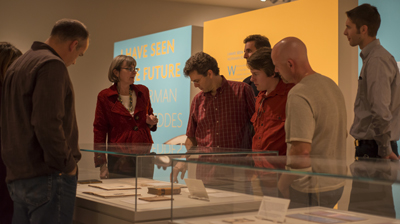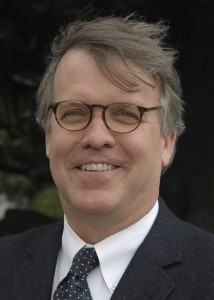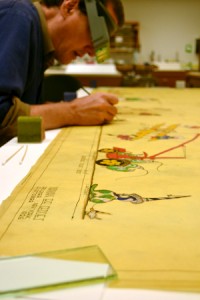
Stephen Enniss, Director of the Harry Ransom Center, shared his thoughts about the proposed elmination of the National Endowment for the Arts and the National Endowment for the Humanities in an opinion editorial in the Austin American-Statesman. Below is the piece that ran on March 10.

President Donald Trump’s reported plan to eliminate the National Endowment for the Arts (NEA) and the National Endowment for the Humanities (NEH) reflects a profound lack of understanding of the value and meaning of the arts and humanities in American life.
And the impact of the proposed cuts will be felt right here in Austin.
For instance, I am the director of the Harry Ransom Center, a research library and museum at The University of Texas at Austin, which makes its rich cultural collections available to all for free. On display in the lobby are three treasures of our culture: a Gutenberg Bible, the earliest surviving photograph, and Frida Kahlo’s remarkable Self-portrait with Thorn Necklace and Hummingbird. In the galleries, the Ransom Center hosts a variety of ever-changing exhibitions that in recent years have included The King James Bible: Its History and Influence, Shakespeare in Print and Performance and The World at War, 1914-1918.
The proposed elimination of funding for the NEA and the NEH threatens this type of work and threatens to displace art and culture from the center of our lives.
The Ransom Center’s exhibition program is just one example of the NEH’s work in the Austin community. A recent challenge grant from the NEH created an endowment that provides annual operating support for the center’s exhibition program and allows us to share these collections with all. The endorsement of our work by the agency also made it possible to attract private contributions that have now far surpassed the original investment, thus compounding many times over the positive impact of our tax dollars.

To those who suggest the government should have no role supporting such activities, perhaps they should remember that the arts and culture have always been closely aligned with our national story. After the burning of our Capitol during the War of 1812, Congress had the foresight to acquire the library of Thomas Jefferson as the foundation for what is today the Library of Congress. During the Great Depression Eudora Welty, Zora Neale Hurston and numerous other writers and artists undertook federal commissions, and Walker Evans produced a series of photographs that will always define that period in our nation’s life.
The idea that culture should be privatized and its beneficiaries limited to those who can afford to pay is fundamentally undemocratic and fails to recognize the valuable contributions the arts and humanities have to make toward our shared civic life. The arts and humanities celebrate individual creativity while also serving to remind us of all that we have in common.
In recent years, the NEH has helped the Ransom Center preserve historical archives that would otherwise have been threatened by the slow fires of time. It has ensured the survival of endangered audio recordings and funded the exhibition of numerous collections including, to single out just one, the archive of the American designer Norman Bel Geddes, who helped give shape and form to America’s future.

The question for us today is: What future we will leave those who follow us? Our libraries and museums are nothing more, and nothing less, than reflections of who we are and what we value as a society. What we choose to remember defines our national character and the nature of the country we will pass on to our children. For more than 50 years, the NEA and the NEH have celebrated the best in this still-evolving national story, and they have been a powerful check against the forces of forgetting.